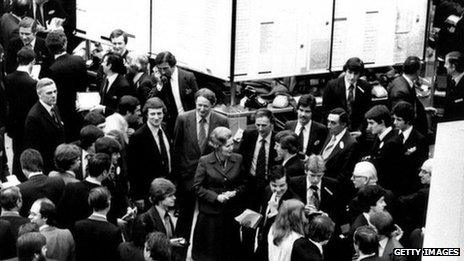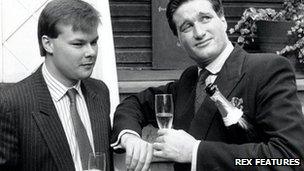Viewpoint: Putting finance in its place
- Published

The stock exchange - here being visited by Margaret Thatcher in 1979 - was unshackled under her government in the Eighties
Roger Bootle, managing director of Capital Economics, says the proliferation of complex financial instruments - such as "trading options on the volatility of the dingbat" - has not brought much benefit to the economic system.
Economic ideas move in circles; stand in one place long enough and you will see the same old ideas come round again.
Twenty-five years ago, the so-called "Big Bang" in the City of London ushered in a new era in finance with many old restrictions swept away, including the distinction between stock brokers and jobbers, which prevented a broker which advised and carried out transactions for clients from taking positions in securities.
Much the same thing had happened a few years earlier in the US. Supposedly, these changes would make finance more competitive and dynamic.
At one level, these hopes were justified. The City of London prospered as never before. Old-style merchant banks and stockbrokers were gobbled up, as London became the home of huge investment banks, both American and European.
In the US especially, but also in Europe to a degree, banks in particular and finance in general prospered. The proportion of national income accounted for by financial activities rose sharply - as did the money earned by people working in financial businesses.
But those restrictions on financial activities had been there for a reason. In the United States there was a widespread view that the Great Depression had been intensified, if not caused, by the antics of high finance capitalism.
After that experience of abject depression, involving umpteen millions of people unemployed, it was widely acknowledged that it was important to keep finance in its box.
Lessons of the past
In the UK, the experience of the 1930s and the intellectual and policy reaction to it were not as stark, but there was a widespread suspicion of markets in general and finance in particular. And the intellectual legacy of the great British economist, John Maynard Keynes, was that finance was different - and especially dangerous.

Some clearly benefit from an increasingly complex financial system, but does society?
The UK, he argued, had gone back onto the Gold Standard in 1925 to appease the financial interests of the City. It was industry that paid the price, in the form of a loss of competitiveness that worsened unemployment and intensified social and industrial unrest.
In the years after the war, as the economies of the West prospered, and without any major earth-shattering financial crises, these attitudes to the restriction of finance came to seem increasingly fuddy-duddy.
So the legal and regulatory changes of which Big Bang was a part represented the over-turning of a conventional wisdom that had been fraying at the edges for years. The beginning of the new era caused barely a stir.
Similarly in the US, when the Glass-Steagall Act, that separated investment banks from commercial banks and which had been passed in 1933, was repealed in 1999, scarcely anyone objected.
Now the wheel has turned again. As a result of the financial crisis of 2007/8, whose consequences are all around us, we learned that banks are uniquely powerful and uniquely dangerous.
The idea that we can comfortably leave their behaviour to their managements, and that market forces will constrain their actions in pursuit of private profit to coincide with the public interest, now seems quaintly naive.
So this has meant enforced increases in capital holdings and proposals to separate retail from investment banking.
What use finance?
But there is another issue which is still to be settled. What good does financial activity do for society?
There is no doubt that certain sorts of financial activity are vital for the successful functioning of a modern economy.
Indeed, one of the defining features of a poorly-developed economy is the absence of much financial activity.
Finance enables people to live in houses that they own before they have fully paid for them, and to live in old age off the fruits of other people's labour; it enables businesses to invest other people's money in profitable enterprise, and it enables individuals and businesses to pool and offload risks which would otherwise discomfort and inhibit their activities.
But finance can get too big and go too far.
When it comes to trading options on the volatility of the dingbat, you know that things have reached this point.
The proliferation of complex financial instruments over the last 30 years has brought scarcely any benefit to the economic system - but it has brought considerable extra costs.
The former chairman of the US Federal Reserve, Paul Volcker, has said that the only recent financial innovation to have brought real benefit is the automatic cash dispenser.
How is it that a competitive, market system could support so much unproductive yet over-remunerated activity?
Possible solutions
Firstly, it is because this part of the economy is not very competitive. At the retail end, although there are lots of providers of financial services, their customers find it next to impossible to decipher complex charging structures and to switch easily between different providers.
At the corporate level, whether it is mergers and acquisitions advice or arranging the underwriting of share issues, there are relatively few providers. Moreover, because the purchasers are not paying out their own money, they are fairly insensitive to the outrageous charges that are levied. The result is a financial system that is excessively large and overpaid.
Pay is not only an emotive issue, as defenders of the status quo allege; it is also an index of efficiency.
There is no good reason why financial professionals should earn multiples of what top doctors, lawyers or accountants earn. It is only when they earn comparable amounts that we will know that the financial sector has been cut down to size.
The second reason for the size of the financial sector is more disturbing: much financial activity is essentially distributive in nature - what is won by one party is lost by another, with a huge chunk of income creamed off by the financial professionals who intermediate this activity.
Far from applauding when the size of the financial sector increases, it should now be part of public policy to reduce its size and importance in accordance with its true contribution to society's well-being.
The idea of the so-called Tobin tax which imposes a small tax on all financial transactions would potentially make a real difference. If implemented globally, the result would be a large reduction in the volume of trading.
I would also favour changes to the rules governing dividend entitlement, which favoured long-term investment over short-term trading. There could also be restrictions on mergers and acquisitions activity.
Interestingly, although there is not yet any consensus on the precise measures to be adopted, there is now a consensus on the need for some sort of radical action.
Very few people now believe that the financial sector can and should be left to its own devices. It is a pity that it has taken a near financial catastrophe to bring us back to the position that seemed all too obvious after the shenanigans of the 1930s.
Roger Bootle is managing director of Capital Economics. He is the author of The Trouble with Markets.